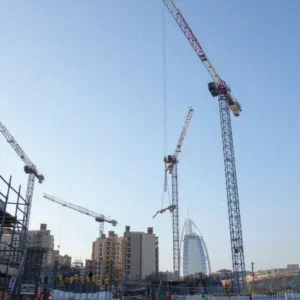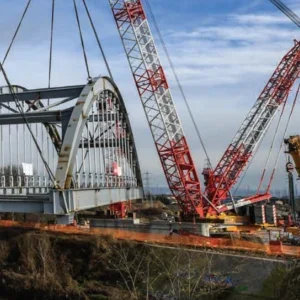Since 1999, the Florida Crane Owners Council (FCOC) has been wor king hard to suppor t the local crane industry live up to the great ambitions of its mission statement. This is ‘to collectively address the issues and concer ns of Florida crane owner s and associated industries, in a unified effort to develop and monitor laws, regulations and standards for a safe, efficient future of the crane industry in the State of Florida.’
At its peak, before the recession, there were 34 member organisations, from crane rental companies and contractors, to manufacturers and training firms. Today there are 31, which FCOC managing director John Wessel says has been growing since the economic environment began to improve. "We were down to 22 members in 2010 when the recession hit but we have built it up again," he says.
The US industry does have an organisation to represent its interest at national and international level in the Specialised Carriers & Rigging Association (SCRA), but for crane owners in Florida this was not enough. "The US crane and construction industry is highly regulated on both the Federal and State level and Federal regulations prevail over state regulations," explains Randy Strickland, chairman of FCOC since January 2014 and president of Lakeland Crane Group. "Unlike Europe and other regions of the world, each of the 50 states has its own set of regulations for the safe and efficient use of cranes during transport, assembly, disassembly, and use on the job site."
This means that it is vital for firms to be aware, and involved, in local developments, as well as those at federal level. And for a busy and expanding state such as Florida, which remains popular as a retirement destination for citizens across the country, the construction market is more active than most. In fact the state is the only one to have a state crane safety alliance that involves the US’s highest health and safety organisation the Occupational Safety and Health Administration (OSHA).
"We work very closely with the Florida Crane Safety Alliance which serves as OSHA’s local state voice for compliance. Safety is our major goal and objective. The safe and efficient application of mobile cranes In the current market, Wessel says that the biggest issue that the industry in Florida has to contend with is one that affects crane owners throughout the US: transportation. "I have worked in the crane industry for 47 years, it was an issue back then and it is still an issue now.
We are never going to bring all the states together and have one set of requirements," accepts Wessel. "So if you are a company in Northern Florida with business in Georgia and Alabama you have got to make sure your crane is configured so that you can go into Georgia and Alabama."
This is a huge issue, not least because axle limits and permissive routes can change.
"We monitor the federal laws and regulations the best that we can, but more importantly we monitor the state of Florida and we work closely with the Florida Department of Transportation as they try to change or improve requirements."
A good example is a bridge inspection revealing that a bridge can no longer support the original design capacity and therefore the weight allowance is reduced.
Lobbying for change Changes like this may be necessary but the FCOC is ready to challenge changes if they would be detrimental to crane owners. Wessel points to an important achievement of the organisation concerning the potential introduction of new crane safety legislation in Miami Dade County.
"I always think that crane accidents are like aircraft incidents because they are catastrophic," says Wessel explaining that the catalyst for the county attempting to introduce a new safety ordinance was a fatal tower crane accident in 2006. "As a result Miami Dade County decided that they were going to establish their own crane regulations. FCOC said we can’t allow this to happen because there are 67 counties in the state of Florida and if they all established their safety criteria it just wouldn’t be workable because the crane owners go from city to city."
Wessel says that the new regulations would not have prevented the tragic incident. Furthermore several of the requirements of the new regulations were considered to be counterproductive in safety terms. Back in May 2008 Cranes Today reported on the lawsuit filed to block the new law. FCOC was working with the Associated Builders and Contractors, Inc., Associated General Contractors, and the Construction Association of South Florida. Experts from the group argued that the new ordinance would have required cranes to be climbed three times more often.
As climbing is one of the riskier aspects of crane operation, FCOC argued that the ruling would make tower crane use more dangerous. It also raised concerns over the requirement to tie cranes down and treat them as permanent structures which makes the crane and building more rigid than it is designed to be, increasing the risk of damage. For this and other reasons the group argued that none of the county’s 200 tower cranes would be able to comply with the new safety regulations. "That was a very big thing," says Martha Kirby, vice president at Crane Rental Corporation (CRC), a member firm of the FCOC. Firms were concerned that if Miami Dade set its own standards then other counties might follow. "If you had something like that in every county it would just be impossible to work," she says.
Fortunately for FCOC and other industry groups the state lawmakers agreed. "The Supreme Court ruled that the county cannot create its own crane safety regulation because the industry is well covered at the state and the federal level," says Wessel.
is our number one priority," says Strickland. Horizontal Immunity win Another major legislative success of FCOC was the introduction of the new ‘Horizontal Immunity Law’, that came into effect in Florida on January 1 2004. The law put an end to what Wessel describes as the "deep pockets theory" where in the event of an accident on site, victims named every company involved in the project irrelevant of whether or not the company had any involvement in the incident.
The lawsuit compensation payment was then spread among the group of companies. FCOC campaigned for three years for the horizontal immunity law, which Wessel says goes after the companies that were directly involved with the accident. "Just because a crane is onsite it doesn’t mean we are at fault,"
says Kirby who also lobbied with the group on the issue. "There are so many other considerations and other people on site, riggers, lift directors, signal person and so many other people responsible to make a safe lift on a job site. That is what this new legislation has done, make everyone else aware of it. We were already aware of it."
Supported by well known lobbyist Rick Watson, from Watson & Associates in Tallahassee, the group saw the Florida Legislature enact substantial changes to Florida Statute 440.10 and enact Horizontal Immunity between sub contractors in October 2003. This was effective from January 1 2004 and ensured that an injured worker could only seek compensation from another subcontractor on the project if they could prove that this particular subcontractor had been negligent and that this negligence had led to the injury. "It has helped reduce the insurance costs that a crane owner must carry and it had insurer support because they found they were having to pay when they were not involved," says Wessel.
More recently, the group has been tracking issues such as the implementation of the new OSHA Crane and Derrick Standard, which is federal legislation and has been around a decade in the making. "The new standard became effective November 2010 with certain sub-parts being phased in over time. Right now we are focused on certifying our crane operators by November 14, 2014," says Strickland. A key provision of the new standard is that all crane operators must be certified by this date which includes signal persons, lift planners and others. As the new legislation was developed, members of the committee devising it came to talk to the FCOC which Kirby says was really helpful for members.
Beyond the formal lobbying on legislation, FCOC companies point to a host of other advantages of being members of such a group. Networking opportunities are particularly important in the sector where companies often work together to service clients. "A member might bid a job with his three cranes but the job needs 5 so they work with one another," says Wessel.
Members also say that the mix of companies in the organisation is also an important benefit. "We have the manufacturers there too and it helps us know about new products coming out and they ask for our opinions too. The knowledge base we can develop helps us all," says Kirby. She says that this kind of knowledge sharing has directly made CRC more successful as the owners, the Ashlock family, diversified their product range in order to remain strong during the recession. "When I star ted here 36 years ago, we had two cranes and now we have well over 100. Our smallest is 28t and we go all the way up to 825t with our crawler cranes," says Kirby. Expanding into other areas such as heavy haulage hydraulic trailers has been particularly good for the firm.
Future proof
Inspiring young people to consider a career in the crane and construction industry is also an important objective of FCOC, and to that end this year it has opted to work with a local initiative called Florida Construction Career Days. By donating $2000 and sending cranes out to the career events, FCOC hopes to encourage more students into the sector. The event is co-chaired by Loreen Bobo, an engineer and project manager at the Florida Department of Transportation and Nicole Colon of communications consultant QSA. In order to increase the number of workers in the construction industry,
transportation industry officials in Florida began an educational outreach program for high school students in 1999. The program is called Construction Career Days and is intended to introduce high school students to the wide range of career opportunities available in the construction industry in a hands-on environment. While the event itself is organized by an amazing group of people who volunteer not only their time, but their company time as well, it also relies on donations and sponsorships from local industry partners which in 2014 included the Florida Crane Owners Council.
At the August FCOC meeting, the Central Florida Construction Career Days Co-Chairpersons, Loreen Bobo and Nicole Colon gave a presentation on their efforts in Central Florida and how the donation was going to benefit. The sponsorship will help make it possible to give students within the central Florida area an opportunity to receive scholarships to further their education and/or careers goals.






